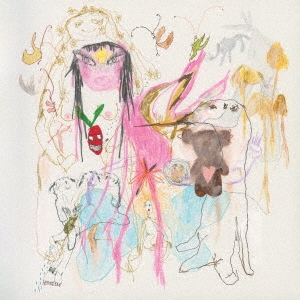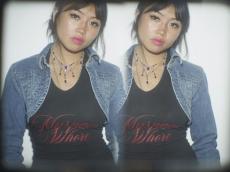Interview with beabadobee about “Beatopia”
NeoL / 2022年10月3日 17時0分
ビーバドゥービーの新しいアルバム『Beatopia』は、彼女が7歳のころに頭のなかで思い描いた空想の世界がコンセプト。成長するティーンエイジャーの胸の内を吐き出したような前作『Fake It Flowers』とは印象を変え、オープンで、フレンドリーで、サウンドもジャンルレスに飛躍を遂げた『Beatopia』には、THE 1975のマシュー・ヒーリーとジョージ・ダニエル、ピンクパンサレスなど多彩なミュージシャンがゲストで名を連ねている。しかし、辛いときに現実を紛らわすための逃避先だったというその空想の世界に記憶をさかのぼり、自分の感情と向き合うことから始まった制作の過程は、けっして平坦なものではなかった。4年前にデビューした際には、自分の音楽について「18歳になるまでの10代の不幸の歴史を継ぎ接ぎした曲のコレクション」と語っていたビーバドゥービー。そんな彼女が、『Beatopia』を通じて過去の自分を受け入れ、いまの自分を愛せるようになった背景には、何があってどんなことが起きていたんだろう。サマーソニックのステージを控えた前日、原宿のオフィスで彼女に話を聞いてみた。 (→ in English)
――初めての東京はいかがですか。さっそくSNSではあなたの目撃情報が上がったりしていますが。
Bea「まるで映画のなかにいるような感覚。つねに音やノイズが鳴っていて、至るところで音楽が流れているような街並みは本当にクールだと思う。昨日の夜はドンキに行けて、本当に楽しかった(笑)」
――以前インタヴューした際には、「日本に行けてないことは、パズルで最後のピースがみつからないフィーリングと似ている」と話していましたね。
Bea「日本のカルチャーにはずっと前から興味があって。前作の『Fake It Flowers』も日本のファッション――『FRUiTS』という雑誌にインスパイアされたものでした。それでそのことを撮影を担当していたスタッフに伝えたら、幸運なことにショーイチ(※『FRUiTS』の編集長だった青木正一)に撮影してもらえることになって。『FRUiTS』は私にとって、つねにファッションとアートの大きなインスピレーションであり続けています。そう、だから(今回の来日は)まさに最後のピースを埋めるようなもので……でも、まだパズルが完成したわけではないので、また戻ってきたいと思っています(笑)」
――いま話してくれた撮影の話は『The Face』のことですよね。あれはビーさんのアイデアで?
Bea「いえ、『The Face』側が提案してくれたアイデアでした。それでショーイチが撮影してくれることになって、その写真をカヴァーに使ってくれたんです」
――ちなみに、『FRUiTS』はどうやって読んでいたんですか。
Bea「イギリスでは手に入れることができないので――まあ、ebayで買えたりするんですけど、当時の写真を載せているインスタグラムのアカウントをフォローして、それをチェックしていました」
――『FRUiTS』のスナップは当時、このビルのすぐ近くで撮影されていたんですよね。でも、そうやって日本のファッションをチェックしていたビーさんですが、いまではご自身がファッションやメイクについて世界中のファンからチェックされる立場なわけで。そうした状況をビーさん自身は楽しめていますか。
Bea「変な感じですね。だって、ファッションについて自分にアドバイスを求めたりそれに従ったりするひとがいるなんて、誰かから指摘されるまで考えもしなかったので。私自身は何か厳密なルールに従っているわけではなく、ただ着心地のよいもの、身体にフィットするものを選んでいるだけで。もちろん、私の着こなしが好きなひとがいるのはとても嬉しいことだし、みんなに愛されているんだなって実感できて、感無量です」

――今回の新しいアルバム『Beatopia』はとてもオープンで、フレンドリーで、ジャンルレスで、前のアルバムの『Fake It Flowers』から大きく変化した印象を受けました。その変化って、どういうところから生まれたものなんだろうって。
Bea「いちばんの理由は“成長”で、つまり大人の女性になったということだと思います。それに曲の書き方に関しても、自分のなかにまったく境界線がないように感じていて、今回はずっと自由でした。とくにロックダウン中ということもあって、他人を意識せずに済んだというか、制作の間は自分以外の誰もこのレコードを聴くことがないような気がしていて。だからなんのルールに縛られることもなかったし、それは自分にとって間違いなく成長だったんだと思います」
――たとえば、前作のときの自分と今の自分を比べて、どんなところに成長や変化を感じますか。
Bea「いまの私は、自分自身のすべてを受け入れることができるようになるための道半ばにいます。でも、前作のときと比べて、自分を愛せるようになれたのは確かだと思います。もちろん、自分の昔の曲は好きだし、いまでもライヴで演奏していますが、時々、自分ではない誰かのふりをしているような気がしていました。それは、髪を染めたり、いつもと違う服装をしたりといった単純なことなんですけどね。だから、このアルバムでは少し(本当の)自分自身に近づけたと思います」
――その変化や成長のきっかけ、自分を愛せるようになれた理由はなんだったんですか。
Bea「それは年齢も関係していると思います。とくに、この何年間は学ぶことが多くありました。恋人と別れたり、家を出て家族と離れたり、いろいろな辛いことを経験しました。なので、要因はたくさんあります。それとミュージシャンの場合、ツアーに出ることで(他のひとよりも)成長することを余儀なくされているような気がします」

――前作をリリースした際には、「どの曲もとてもパーソナルなもので、世界に披露するのは怖かった」と話されていましね。
Bea「そうした感情はつねにあります。なぜなら、私が作る曲はどれもパーソナルなものなので。ただ、『Fake It Flowers』は特定の個人について具体的に歌ったものだったので、より怖さがあったんだと思います。たとえば『Fake It Flowers』の曲を演奏すると、後で何通かメッセージが届くんです。『あれ、自分のことを歌った曲だよね?』って。『Fake It Flowers』は過去のことについてたくさん歌ったアルバムでした。ただ、今回の『Beatopia』では、そこから前に進み、長い間押し殺してきた感情、忘れ去られてきた感情、恥ずかしいと思っていた感情をようやく受け入れて、認めて、共に生きることができるようになりました。それがあったからこそ、成長することができた作品なんです。そうした感情に絡め取られるのではなく、ね」
――ブレイクスルーとなった曲を挙げるなら?
Bea「“See You Soon”だったと思います。ただ、『Beatopia』のために最初に書いたのは“Tinkerbell Is Overrated”で、あの曲を聴くとアルバムのことがよくわかると思います。『Beatopia』は、気まぐれで、とても奇妙で、風変わりなアルバムにしたかったんです。“Tinkerbell Is Overrated”は、このアルバムがどのようなものになるかの足がかりとなった曲でした。対して“See You Soon”は、このアルバムのテーマであり、『Beatopia』の全部が凝縮されているような曲だと思います」

――今回のアルバムは、ビーさんが7歳のときに思い描いた、辛い現実から逃避するための空想の世界=“Beatopia”がコンセプトになっています。ただ、今回の制作にあたって、そうした過去とあらためて向き合うことは大変だったのではないですか。
Bea「辛かったですね。ロックダウン中は、自分の感情とひたすら向き合うための時間をたくさんもらって。部屋にずっと閉じこもっていると、自分の感情から逃げられないし、気晴らしもできないので、何かを感じたらそれと向き合うしかなかった。それは大変なことですが、とても必要なことだと思うし、成長するための過程の一部だったと思うんです。自分の人生を前に進めるためには、子供の頃に理解できなかった感情や、押し殺してしまった感情をもう一度見つめ直さなければいけないこともあるんだって」
――前回『Fake It Flowers』のときのインタヴューで印象的だったのは、あのアルバムは15歳のビーさんがそのまま詰まった作品で、当時の自分と似た状況にいる女の子たちがあのアルバムを聴くことでパワーを得て、人目に左右されずにやりたいことをやっていいんだってことに気づいてほしい、と話していたことで。今回の『Beatopia』を聴いてくれたファンには、どんな声をかけたいですか。
Bea「成長すること、自分の過去を受け入れること。そして過去の出来事をいまの自分の行動の言い訳にするのではなく、そこから前に進むことを学ぶこと。恨みを抱かないこと。それが『Beatopia』の大きなメッセージだと思います」


――ビーさんの音楽は、自身の経験から生まれたとてもパーソナルなものですが、ただそこには、作品の向こう側にいるファンやリスナーの存在がつねに意識されている。それは自然とそうなったのか、それとも、自分も過去にそうして音楽に後押しされた経験があるからなのか、どちらなんでしょうか。
Bea「ごく自然とそうなったんだと思います。これだけパーソナルな音楽を書いていると、自分が話していることに共感してくれるひとが必ず出てくるんです。実際の出来事について話しているわけだから、その時点でほとんど必然的にそうなるんだと思います。結局のところ、私は22歳の女の子で、同い年の女の子や他の多くのひととなんら変わらない問題を抱えているわけで。だから共感してもらえるととても嬉しいし、私も『ひとりじゃないんだな』って感じることができるんです」
――ちなみに、15歳のときでも7歳のときでも構いませんが、音楽を聴いて「これは自分の歌だ、自分のことを歌った曲だ」と感じた経験ってありますか。
Bea「7歳や15歳のときはとくになかったのですが、共感できる音楽を見つけるようになったのは、実際に自分で音楽を作り始めたことがきっかけだと思います。18歳のときにいろんなバンドを聴くようになって、自分の人生と繋がりを感じられるような音楽と出会いました。ラリ・プナ(Lali Puna)の曲で、『自分のことを最悪だって思うときは、自分が最悪なんじゃなくて、自分がそれを気にしちゃっているときなんだよ』というような歌詞があって。つまり、問題があるのは自分の見た目なんかじゃなくて、それを気にしている自分、っていう。この歌詞はずっと心に残っています。私も自尊心に問題を抱えていたから。この歌詞を聴いて自分自身に言い聞かせると、気持ちが楽になるんです」

――今回いろいろなミュージシャンをゲストに迎えることになったきっかけとして、去年The 1975のマシューとジョージとコラボレーションしたEP『Our Extended Play』の経験が大きかったそうですね。ふたりは今作にも参加していますが、ビーさんにとってマシューとジョージは、音楽以外のことでもいろいろと教えてくれたり導いたりしてくれる存在なのかなって。
Bea「そうですね。とくにマシューは私にとって兄のような存在で、時々うっとうしいけど(笑)、本当に素敵なひとです。彼がくれた最高のアドバイスのひとつは、私が別れを経験したときのこと。彼は『君はまだ若いから、いまはそんなに深刻なことを考える必要はない、自分を幸せにしてくれる何かを見つけた方がいい』と言ってくれて。そして、彼は恋愛を“庭”にたとえました。『庭を美しく豊かにするためには、手入れをする必要がある。でも君は22歳で、まだ若いから、水をやり続ける必要がない、つねに生き生きとした庭を欲しがるものなんだ。若いからそれでいいんだよ。ただ、落ち着いて余裕ができてくると、庭仕事の時間ができて、庭を育てることをエンジョイできるようになる』って。以来、私の頭のなかにはそのような“愛の観念”が刻まれています」
―― 一方でマシューは、たとえばフェスの出演者におけるジェンダーバランスについて提言したり、社会的なメッセージを発信することやその役割を負うことに意識的ですよね。そうしたマシューの姿勢に感化されたり、考えさせられたりすることはありますか。
Bea「すべてのミュージシャンにとって、自分が信じていることをはっきりと表明することは大切だと思います。それも、プラットフォームを持ち、自分に期待してくれて支持してくれるひとがいる場合であればなおさらです。とくに、それが社会にとってポジティヴで良いことであるならば、自分が信じていることを伝えずに多くのひとに注目されることに何の意味があるのかな、って思うんです」
―― 一昨年に開催された88 risingのイヴェント「Asia Rising Forever」に出演した理由について、「音楽業界におけるこのコミュニティの一員でいたいと思ったから。素晴らしい作品を作っている新しいアジア人のアーティストたちを見てみたいという気持ちもあった」と話していましたね。同じように、ビーさんに対してそうしたコミュニティのロールモデルとして期待し、支持を寄せる声も多いのではないでしょうか。
Bea「それはとても幸せなことだし、自分自身を誇りに思えることです。小さい頃は、自分と同じようなひとに憧れたり尊敬することはありませんでした。どこかの女の子や誰かのための何かになることは、自分がやっていることすべてに価値があるんだって感じさせてくれます。だって、それがすべてなんだから」

photography Satomi Yamauchi(IG)
text Junnosuke Amai(TW)

beabadoobee
『Beatopia(ビートピア)』
Now on Sale
(Dirty Hit)
※国内盤はボーナストラック(曲)、歌詞対訳、ライナーノーツ付
Tracklist
1. Beatopia Cultsong
2. 10:36
3. Sunny day
4. See you Soon
5. Ripples
6. the perfect pair
7. broken cd
8. Talk
9. Lovesong
10. Picture of Us
11. fair so
ng 12. Don’t get the deal
13. thinkerbell is overrated
14. You’re here that’s the thing
15. Back to Mars (ボーナストラック)
https://www.virginmusic.jp/beabadoobee/

――This is your first time in Japan. How has it been?
Bea : It’s good. It’s almost like living in a movie here. There are so many things to see and there is constant sound, constant noise, and constant music playing in the streets. I think it’s cool. I properly explored the city last night. I went to Donkey!
――In your last interview with us for “Fake it Flowers” you mentioned that going to Japan was like the last piece of the puzzle. You’ve been interested in Japanese culture for a long time.
Bea : For a long time. It kind of inspired the fashion for Fake it Flowers, like the Fruits magazine. I was lucky enough to be shot by the photographer of Fruits Magazine, Shoichi. It has always been an inspiration for fashion and art here. So it’s kind of like finishing the puzzle a little bit. I want to come back though, properly do it, it’s not done yet.
――Your recent photoshoot with The Face magazine seemed like a homage to the Fruits magazine. Was that your idea?
Bea : It wasn’t mine it was The Face's idea. Shoichi haven’t done a magazine cover in ages so he flew out which was cool.
――How did you get the Fruits magazine in the UK?
Bea : You can’t but you can get it on eBay. I don’t own Fruits magazine. I just follow loads of Instagram accounts that post pictures from that time.
――Similar to the way you were interested in Japanese fashion, now everyone is paying attention to your fashion and make-up. How do you feel about that?
Bea : It’s very weird because I don’t even think about it until someone pointed out that people follow my fashion advice. But I don’t necessarily follow a strict vibe. I just dress for comfort. I feel very appreciated and overwhelmed that people like the way I dress.

――This new album is more open, friendly and gender-free. You seem to be giving more to the audience in this album. How did this transition happen?
Bea : I think it was growing up, maturing and feeling much freer in terms of the way I write my music. I felt like I had no boundaries this time. Especially doing it over a lockdown felt as if no one was going to listen to this record apart from myself. So I felt like I had no rules, I wasn’t abiding by any rules. It was definitely about becoming a grown woman.
――You said you matured from the previous album. When you compare yourself now to when you wrote your first album, what did you think changed?
Bea : I’m still on the road to self-acceptance but I think I have grown to love myself a bit more. Much more than how I was in the Fake it Flowers era. I love all my old music and I still play it live but at times I felt like I pretending to be someone I wasn’t. It can be something just as simple as dyeing my hair colours or dressing differently. So I think I have grown into myself a little bit more in this record.
――Was there an occasion or a turning point where you came to accept yourself more?
Bea : Age comes in a factor. Learning and experiencing a lot of stuff and going through intense hardships or breakups or being away from home and family. So there are a lot of factors. Especially if you are a musician and you go on tour, I think you are sort of forced to go out a bit more than other people.

――The first album was very personal and you were scared to release it to the world. What about this new album? Did you feel anything like this at all?
Bea : I always feel it with my music because that’s how I write my music. It’s all very personal. I think what scared me more for Fake it Flowers was that it was about certain individuals, every song was about a person. Every time you do that you get a few messages where people are like the song is about them. At Fake it Flowers I was talking about the past so much and with “Beatopia” I was moving on from it. I was accepting those feelings I had for so long pushed under the rug and forgotten or embarrassed about. Now I can just live with them and accept them, grow from them instead of being tangled in them.
――In this new album, which song do you think will break through?
Bea : For this album I think it was “See you soon” but the first song we wrote for Beatopia was “Tinkerbell is overrated” and I feel that really explains the record. We wanted it to be whimsical, really weird and different. I think that was the stepping stone to what this record was going to be. “See you soon” was like what the record was about and it encapsulates the whole Beatopia.

――”Beatopia” was the imaginary escape for you when you experienced hardship as a seven-year-old. Was it hard to face the past?
Bea : It was hard. I think a lot of lockdowns were spent being with my feelings and having nowhere to escape with feelings, no distractions. Having to be in a room and noticing why I have to face these feelings. Although it's hard I think it's very necessary and it's all part of growing up. Sometimes you have to revisit feelings you didn’t understand when you were a kid or feelings you pushed away to be able to move on with your life.
――I’m guessing you learned a lot through lockdown?
Bea : Yes, I learnt a lot and I couldn’t escape my feelings during lockdown because you are stuck in the same place for so long.
――Because of this lockdown, we weren’t able to see your show for Fake it Flowers. It must be upsetting.
Bea : Yea, that would have been cool.
――The last album, Fake it Flowers was about your feelings and emotions when you were fifteen. You wanted this message to reach other fifteen-year-old girls who might be going through the same thing, and remind them that they were not alone. Do whatever you want to do and be free.
What is the message for this album?
Bea : I think it’s embracing growing up and your past instead of using it as an excuse for the way you act in the present day. It’s about learning to move on from things and not hold grudges. I think that was the main message for Beatopia.


――All of the songs you write are based on your own experiences and feeling. They are all personal. On the other hand, the music is for other people as well. Were you conscious of this connection?
Bea : I think it happened very naturally. When you write such personal music, you are bound to have people relate to what you were talking about. You are talking about real-life things. It is inevitable. At the end of the day, I’m like a twenty-two-year-old girl. I’ve got the same problems as a load of other girls and people so it’s very easy. It makes me feel less alone when they relate to it, as much as it makes them feel less alone.
――When you were seven and came up with Beatopia, or fifteen years old when you made Fake it Flowers. Did you listen to any songs? Was there anything you related to back then?
Bea : Well, not from seven to fifteen. I found the music that I relate to the most when I started making music by myself. When I was eighteen I started listening to bands. Then I found music that related to my life. The song by Lali Puna has lyrics that go, “It’s not the worst I’ve looked, it’s just the most you ever cared”. I think that always stuck with me. I’ve had really bad self-esteem issues so hearing those lyrics and saying them to myself makes me feel much better.

――You are more open to collaborations since your EP with 1975. Other than music, did Matt and George give you any good advice?
Bea : Matt is like a big brother to me and he’s always been one to me. Annoying at times but he is really lovely. One of the biggest pieces of advice he’s given me was when I was going through my breakup. He said, “Because you are so young Bea, you don’t want to maintain something so serious, you want something that makes you happy” and then he compared love to a garden. To keep the garden flourishing, it needs to be maintained. Right now at twenty-two you just want a flourishing garden that is kept alive. It doesn’t need to be watered constantly. I think I have kept that idea of love in my brain.
――Mat himself is an amazing artist and works to deliver social messages at the festivals he performs in. Some of these messages were on gender equality. What do you think about this role as a musician?
Bea : I think it is important for all musicians to speak out about what they believe in, especially if you have the platform and people looking up to you or following you. What is the point of having that many people looking at you without telling them what you believe in, especially if it is something positive and good for society?
――You were a part of an event by 88rising called, Asia Rising forever. You mentioned in our past interview that you were inspired by other Asian artists and wanted to join such a community.
Now with your new album and fashion attention, you are the role model for those with a similar background. What do you think about this situation?
Bea : It makes me feel very happy and proud of myself. Growing up, I didn’t have many people I looked up to that was like me. To be someone for some girl or anyone, makes me feel like everything I’m doing is worth it. Cause that’s what it’s all about.

photography Satomi Yamauchi(IG)
text Junnosuke Amai(TW)
関連記事のまとめはこちら
https://www.neol.jp/music-2/
外部リンク
この記事に関連するニュース
-
英語で「それは大変だったね」はなんて言う?
OTONA SALONE / 2025年1月9日 7時0分
-
UESHIMA MUSEUM ANNEX オープンのお知らせ ~ 2025年1月15日より、今津景展を開催
PR TIMES / 2024年12月23日 15時15分
-
Shareholder Proposals to Japan Business Systems, Inc.
PR TIMES / 2024年12月22日 14時40分
-
この英語ってどんな意味?「apple of my eye」
OTONA SALONE / 2024年12月22日 7時0分
-
【愛しとーと】国際機関ESQRの品質優秀ダイヤモンド賞「Quality Choice Prize 2024」を受賞!
PR TIMES / 2024年12月20日 13時45分
ランキング
-
1俺はまだまだ現役だ!年金月26万円・65歳の元営業本部長、ノリノリで再就職したが…日本年金機構から送られてきた〈年金カットの通知〉に怒り「あまりにひどい」
THE GOLD ONLINE(ゴールドオンライン) / 2025年1月10日 7時45分
-
2幸せの絶頂のはずが…既婚者の約5%「指輪選びで揉めた」半数は同じ理由
よろず~ニュース / 2025年1月10日 7時50分
-
3「30年物の和式トイレ」も改修できず…350万円を市民から集めた地方大学の雄に「どれだけお金ないのよ」の声
プレジデントオンライン / 2025年1月9日 16時15分
-
4精神疲労で固まりがちな身体をケアする方法 胸椎や胸骨を柔らかく保つと自律神経が整う
東洋経済オンライン / 2025年1月10日 7時10分
-
5「鏡開き」でやってはいけないこと4選! 包丁を使ってはいけない理由とは?
オールアバウト / 2025年1月8日 21時25分
記事ミッション中・・・
記事にリアクションする
![]()
記事ミッション中・・・
記事にリアクションする

エラーが発生しました
ページを再読み込みして
ください










